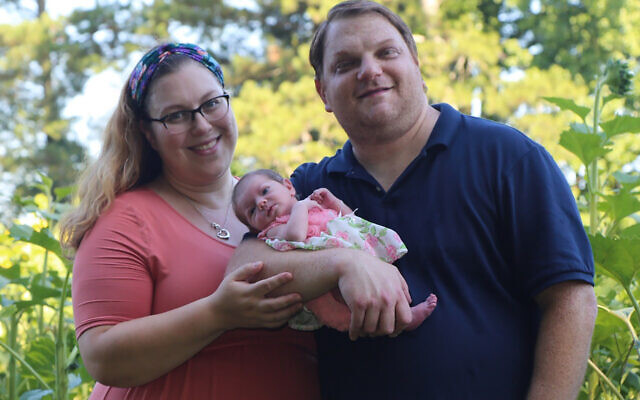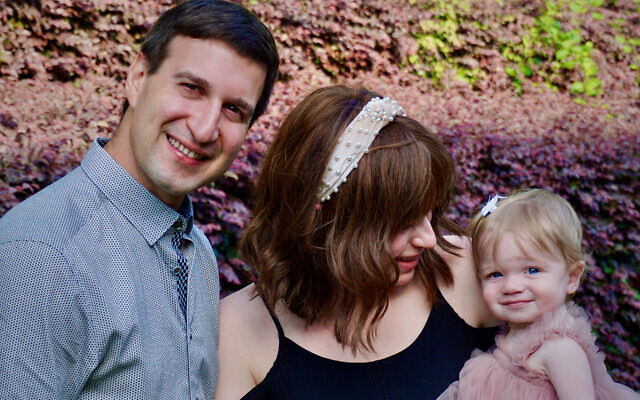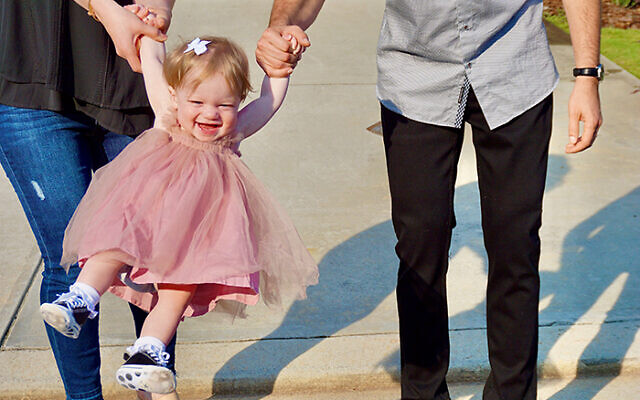Baby Naming During COVID
Parents of newborn girls tinker with Jewish tradition to create meaningful ceremonies for their daughters.
In early March, as the pandemic roared across Georgia and the country, plans for newborn daughters’ baby naming celebrations abruptly changed course for many of Atlanta’s Jewish parents. The baby naming is also known as a simchat bat (joy of the daughter) or brit bat (covenant of the daughter). With flexibility built into this newer tradition for Jewish baby girls – as opposed to the more traditional and biblically based brit milah or circumcision for boys eight days after birth – a number of Atlanta baby naming ceremonies were postponed with the hope families could reschedule for a future date.
Modern baby namings, with roots in the 1970s feminist movement, reveal a wide range of inventiveness when it comes to welcoming a daughter into the Jewish community. These innovative ceremonies go beyond simply explaining the origin of the baby’s name, typically carrying on the legacy of a deceased family member. The ceremony embellishments include setting up a chuppah or special tallit for the family to gather under, or lighting candles.
Thea Rose Benson, daughter of Jaime and Eric Benson, was born on July 2, 2020. Jaime always intended to have a baby naming for her daughter to continue a family tradition that included Jaime’s baby naming in 1983 on Long Beach, Long Island.
The Bensons planned to have the baby naming for Thea at Congregation Dor Tamid, the couple’s Johns Creek synagogue. The new parents said they were going to rely on Rabbi Jordan Ottenstein at CDT to conduct the baby naming and to offer his suggestions on what to include in the ceremony. However, COVID turned her birth and simchat bat plans on their head, forcing them to delay any decision to proceed.
Before COVID, the plan was to have the baby naming before Thea was a month old, but now they were not setting any date because they did not know when an in-person service could take place. Their current hope is to have the baby naming during Thea’s first birthday weekend next July so that family in New York, Washington, D.C., and North Carolina can travel and attend when COVID-19 is no longer a concern. The Bensons told the AJT that “We are praying it can be sooner (or even at all then!) but it’s out of our hands.”
“Family is the most important thing in the world to us, so any future baby naming will absolutely revolve around the generations before us and Thea’s place in a long line of amazing women,” Jaime said.
Details about Jaime’s grandmother Dorothy, whom Jamie described as a major influence in her life, will be told during the simchat bat.
To honor another family tradition, the Bensons may have two baby namings: one in Johns Creek, and the other in Florida as soon as it’s safe so that Eleanor Benson, Eric’s grandmother, can attend. Because she can no longer travel, the Bensons promised her that they would bring Thea Rose to her, as “every single one of our six nephews and nieces on that side of the family had namings at her Florida synagogue,” Jaime said.
Thinking ahead, this first-time mother said perhaps she could work with Rabbi Jordan to come up with a way to incorporate into the simchat bat a tallit she had purchased for herself on a recent trip to Israel.
The Garfinkel family, who lives in Sandy Springs, also made a decision to postpone their simchat bat, not only one time, but twice. In late June 2019, Poppy Garfinkel was born.
But Ali Garfinkel was going through cancer treatment around that time. Once it was in remission, she and her husband Marc started to make new plans for their daughter Poppy’s simchat bat. They confirmed a caterer, ordered personalized napkins, booked the rabbi, and sent out an email invitation. Soon after, the pandemic ascended upon Atlanta and across the world.
Celebrating Poppy’s birth with family and friends was again put on hold. A cancellation announcement went out to await the event with a date to be determined.
While the Garfinkels considered a Zoom event, as they did for Poppy’s first birthday in June, they decided to postpone the simchat bat until it was safe to do so in person. Ali told the AJT, “There is something meaningful and magical, a special tradition rooted in Judaism and culture, that Marc and I want to feel and share with the people who will be pillars in her life.” Even with the latest postponement, the couple named Poppy’s godparents but will not announce her Hebrew name yet until the simchat bat takes place.
The Garfinkels believe that “While the pandemic continues to change and alter the course of everyone’s life, what is more meaningful in this moment while we wait to celebrate our daughter’s Hebrew name, is the time we are able to spend together bonding as a family and teaching her our new family traditions.
How were other Jewish Atlanta parents making plans, if any, to celebrate the birth of their baby daughter born during the pandemic?
“The arrival of COVID just after Purim and before Passover, with the holiday’s attendant anxieties added to the pandemic’s uncertainties, left most people and clergy scrambling,” said Rabbi Michael Berger, associate professor of the Tam Institute for Jewish Studies at Emory University. “Attention was understandably being paid to funerals, shivas and mourning rather than births. Circumcisions had to take place on the eighth day after a baby boy’s birth, especially for the more traditional, but I imagine for many, practically speaking, doing something for a baby girl just didn’t feel as urgent.”
Rabbi Michael Broyde, an Emory law professor known as an expert on Jewish law and ethics, told the AJT, “There is no firm historical tradition as to how to celebrate the birth and naming of baby girls in the Jewish tradition, even as the birth of every Jewish child has always been a source of joy to all.”
Jodi Eichler-Levine, associate professor of the Department of Religion at Lehigh University, seemed to agree. “If there’s no Jewish law forbidding something, there is more room to innovate.” She said it took some time for the new ritual to be widely practiced which got its start, not in biblical times, but during the second wave of the feminist movement in the 1970s.
A simchat bat mainly welcomes the baby girl into the Jewish community. The ceremony can take place at one’s home or at a synagogue during a Friday evening or Saturday Shabbat service where the baby’s Hebrew name would be announced with words about her namesakes.
There is no widely accepted rule about when to hold this ritual, according to those interviewed and resources consulted. The day chosen for the baby naming varies from the eighth day, so that the baby has lived through her first Shabbat, to 30 days later, giving the mother enough time to gain back her strength. The latter is the most common, according to the Union of Reform Judaism, www.reformjudaism.org/brit-bat-ceremony-welcoming-baby-girl.
Parents and rabbis continue to bring their own creativity to planning a simchat bat, Eichler-Levine said. They might use objects or practices from other rituals like a special pillow for the baby to recline upon, as in a brit milah, or she has seen videos of a simchat bat with a chuppah (as at a wedding) held over the whole family as they welcome their daughter into the covenant. “Singing is common, and absolutely there is a discussion of the baby’s name,” she said.
Often a rabbi can offer suggestions for adding new traditions to the baby naming.
Congregation Shearith Israel’s Rabbi Ari Kaiman had not officiated at a simchat bat since the COVID crisis began, but he said he would be willing to work with a family to create the experience. He shared a common ritual he and his wife developed for their three daughters’ simchat bat celebrations.
“A large standing candle is lit, representing the new light that this new life brings to the world. All the attendees light a tealight they are holding from the flame of the large candle, representing the way our light becomes intertwined with one another in community. Once all the lights are lit, he said, “I invited the attendees to offer blessings in their heart before blowing out these candles.” The large candle can then become a ritual object to travel through the life of the baby girl, being used at Bat Mitzvah, wedding, and other important moments.
Kaiman said that if a simchat bat should take place during COVID-19 and Zoom is used, perhaps guests can light their own tea candles at home, and offer their blessings for the baby as part of the ceremony.
Guests can also leave well wishes on Zoom, livestreaming or other video platforms used.
The Reconstructionist movement, www.ritualwell.org, offers a variety of creative ways to conduct a baby naming that includes traditional and new prayers that include finding unexpected outdoor locations, such by the sea or a river, where one can hold this simcha, in addition to a synagogue’s indoor sanctuary or a home.
Eichler-Levine said that Jews have long tinkered with the tradition, and today’s baby namings show how “we are absolutely living in a fascinating moment for creativity around gender and Jewish ritual.”
Here are some other resources to learn more about the baby naming ceremony:
www.anitadiamant.com/books/the-new-jewish-baby-book/
www.chabad.org/library/article_cdo/aid/1158837/jewish/The-Laws-of-Jewish-Names.htm
www.myjewishlearning.com/article/baby-ceremonies/
- Flora Rosefsky
- STYLE Magazine
- Simcha
- Simchas
- Baby Naming
- Celebrations
- Thea Rose Benson
- Jaime and Eric Benson
- Congregation Dor Tamid
- Rabbi Jordan Ottenstein
- Eleanor Benson
- Poppy Garfinkel
- Ali Garfinkel
- Rabbi Michael Berger
- Tam Institute for Jewish Studies
- Emory University
- Rabbi Michael Broyde
- Jodi Eichler-Levine
- Lehigh University
- Congregation Shearith Israel
- Rabbi Ari Kaiman








comments